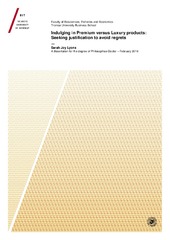Indulging in Premium versus Luxury products: Seeking justification to avoid regrets
Permanent lenke
https://hdl.handle.net/10037/12793Åpne
Dato
2018-05-22Type
Doctoral thesisDoktorgradsavhandling
Forfatter
Lyons, Sarah JoySammendrag
The main purpose of this thesis was to pursue an understanding of premium and luxury perceptions from a consumer’s point of view. It is not obvious where consumers draw the line between what is an ordinary good, what is premium, and what is luxury. Therefore, the first paper takes a general approach to the separating of premium versus luxury from a consumer’s viewpoint. The paper combines a linguistic study with an online experiment and presents evidence for different levels of justification depending on the labels (premium versus luxury) and the value that the product may offer (individual, functional, and symbolic).
Building on the results from the first paper, purchase justification, guilt and regret emerged as topics. Also, how consumers balance the desire for hedonic pleasure, while obtaining the right amount of the utilitarian component for the sake of justification, is a central topic. Accordingly, the second paper tests how the labels “premium” versus “luxury,” in combination with the product type and a prior event of success and failure, may influence the levels of anticipated guilt and regret. The results suggest that consumers in a post-success situation are likely to anticipate less regret and guilt when indulging with a primarily hedonic premium or luxury product compared to a utilitarian one. However, in a situation following a failure, the anticipated levels of regret and guilt are lower for a product that is primarily utilitarian in nature, but this effect only appeared when the participants were looking to buying luxury and not premium. These findings add a novel understanding of how the mindset of the consumer in a post-success and -failure situation in combination with the product’s label may influence anticipated guilt and regret.
Finally, the third paper suggests a practical approach to how premium evaluations may be enhanced through a combination of color on the packaging and the marketing message. In this paper, it is suggested that congruence plays a central role in creating premium associations through color. The results suggest that the nature of the product itself and the framing of the marketing message should be taken into consideration when choosing a color with the aim of creating the image of premiumness.
The results add to the literature on premium and luxury products by suggesting how the nature of the label may generate different levels of regret, guilt, and justification. The knowledge from this thesis may lead to the development of premium food products that consumers are likely to justify. Marketers can use the knowledge to adopt premium and luxury products to meet consumer expectations. Scholars have found that sustainability and authenticity are concepts that are increasingly important for the premium and luxury segments. Thus, consumers want to indulge, but they also want to know that what they buy holds solid quality and meets their expectations in terms of the value it offers. The knowledge generated from this thesis may be useful for marketers of premium and luxury products who want to better understand what cues trigger premium and luxury associations and evaluations to develop and manage products in accordance.
Beskrivelse
Paper I: Lyons, S. J., & Altintzoglou, T. (2018). Premium and luxury: To justify or to show off? (Manuscript).
Paper II: Lyons, S. J., Wien, A. H., & Altintzoglou, T. (2018). Guilt-free pleasures, deserve it or not: How premium versus luxury can influence anticipated guilt and regret. (Manuscript.)
Forlag
UiT The Arctic University of NorwayUiT Norges arktiske universitet
Metadata
Vis full innførselSamlinger
Følgende lisensfil er knyttet til denne innførselen:


 English
English norsk
norsk
